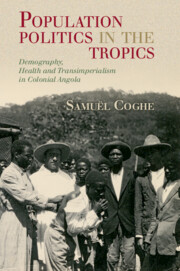Book contents
- Population Politics in the Tropics
- Global Health Histories
- Population Politics in the Tropics
- Copyright page
- Dedication
- Contents
- Maps
- Figures
- Tables
- Acknowledgements
- Note on the Spelling of Proper Names
- Introduction
- 1 Sleeping Sickness, Depopulation Anxieties and the Emergence of Population Politics
- 2 Tropical Medicine and Sleeping Sickness Control Before 1918
- 3 Introducing Social Medicine: Inter-Imperial Learning and the Assistência Médica aos Indígenas in the Interwar Period
- 4 Re-assessing Population Decline: Medical Demography and the Tensions of Statistical Knowledge
- 5 Saving the Children: Infant Mortality and the Politics of Motherhood
- 6 The Problem of Migration: Depopulation Anxieties, Border Politics and the Tensions of Empire
- Conclusion
- Epilogue: Demography and Population Politics, 1945–75
- Bibliography
- Index
Conclusion
Published online by Cambridge University Press: 20 January 2022
- Population Politics in the Tropics
- Global Health Histories
- Population Politics in the Tropics
- Copyright page
- Dedication
- Contents
- Maps
- Figures
- Tables
- Acknowledgements
- Note on the Spelling of Proper Names
- Introduction
- 1 Sleeping Sickness, Depopulation Anxieties and the Emergence of Population Politics
- 2 Tropical Medicine and Sleeping Sickness Control Before 1918
- 3 Introducing Social Medicine: Inter-Imperial Learning and the Assistência Médica aos Indígenas in the Interwar Period
- 4 Re-assessing Population Decline: Medical Demography and the Tensions of Statistical Knowledge
- 5 Saving the Children: Infant Mortality and the Politics of Motherhood
- 6 The Problem of Migration: Depopulation Anxieties, Border Politics and the Tensions of Empire
- Conclusion
- Epilogue: Demography and Population Politics, 1945–75
- Bibliography
- Index
Summary
From the late nineteenth until the mid-twentieth century, colonial actors conceived and tried to implement a wide array of interventions aiming to improve the ‘quantity and quality’ of the ‘native’ population in Angola. These population politics were inextricably linked to the pervasive idea of a demographic crisis: virtually all colonial actors assumed that the ‘native’ population was declining or at best stagnating, and suffering from ill-health. The emergence of these depopulation anxieties was intimately connected with a major epidemic of sleeping sickness in the 1890s and the changing political, economic and ideological imperatives of colonial rule in what had been a Portuguese colony for many centuries. These new imperatives emphasised the importance of a healthy and growing ‘native’ population for the success and legitimacy of modern colonial rule, and the importance of Angola for the future of the Portuguese nation. The ideal of a growing and healthy population was firmly linked to the changing labour demands of the colonial economy: depopulation scares usually intensified in phases of economic expansion, as in the 1890s, 1920s, or during and directly after the Second World War, when they dovetailed with fears of labour scarcity. Depopulation anxieties persisted until the late 1940s, but over the decades, primary explanations gradually shifted from excessive mortality caused by epidemic and endemic diseases to low birth rates, high infant mortality and rampant emigration.
- Type
- Chapter
- Information
- Population Politics in the TropicsDemography, Health and Transimperialism in Colonial Angola, pp. 244 - 249Publisher: Cambridge University PressPrint publication year: 2022

